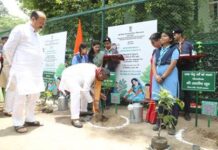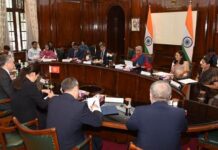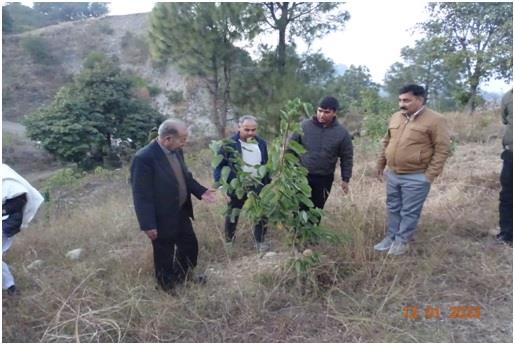SRINAGAR, JANUARY 19: The shared endeavors of Social Forestry Department and Gram Panchayats has substantially proved of huge magnitude towards creation of green assets in rural pockets of Jammu and Kashmir.
Pertinently, Jammu and Kashmir government, after successfully establishing three tier Pancahyati Raj system in the Union Territory, devolved powers and responsibilities with respect to various departments, which marked the beginning of collaborated working between Department of Social Forestry and Gram Panchayats.
Vacant community/state lands under the control of Gram Panchayats are being utilized for taking up plantations which are being maintained by Village Panchayat Plantation Committees (VPPCs). Various successful plantation units have been established in Gram Panchayats during past 4 years under new decentralized working set up.
“The plantation assets are yielding benefits to local people in the farm of Grass and leaf fodder, fuel wood and small timber on equitable basis which is catalyzing the economic well being of rural people”, stated Nazir Benazir, member of J&K Executive Committee, CAMPA. The Executive Committee sanctions and monitors various afforestation activities being funded under CAMPA in Jammu and Kashmir.
Benazir, who recently conducted an extensive field visit of Jammu, Kathua and Samba districts along with senior officers of Social Forestry Department, met members of more than a dozen Gram Panchayats of these districts and inspected the plantation works established in various Gram Panchayats. He interacted with members of VPPCs and local people.
The collaborative working between Social Forestry and Gram Panchayats is an apt example of responsive local self governance which can help accelerate the pace of development in rural areas besides making GPs self reliant.
Nazir was highly appreciative to note that afforestation activities are not only ensuring continuous flow of free benefits like fodder, fuel wood to villagers but Gram Pancahyats are earning substantial funds as proceeds of mature plantations which are being used for development works by Gram Panchayats.
During past nine months of this financial year, 27932.25 quintal fodder and 17982.855 quintal fuel wood has been distributed among 29043 households in 20 districts of the UT. An amount of Rs. 3.33 crore is expected to be transferred to the Village fund accounts of 45 Gram Panchayats as 75% share of the proceeds of mature plantations.
The Sarpanchs and Panchs besides other prominent civil society members suggested to increase the development of Rain Water Harvesting Structures in Kandi belts of these districts to ease out the issues of water scarcity. People are appreciative of benefits which have started accruing due to afforestation and Water and Soil Conservation works. Benefits like increase in agricultural productivity, enhanced supply of forest based produce and supply of water besides moderation of climatic conditions are the expected outcomes of these interventions.
The Department of Social Forestry has initiated measures to take up plantation of fodder yielding local plant species to augment and ensure continual supply of fodder. Farmers are being provided multipurpose plant saplings including medicinal plants for taking up plantation under Agro/Farm Forestry on their farm lands. It plays an important role in increasing income, supply of raw material to wood based industries, creating employment avenues besides mitigating effects of climate change.
Also, the department has initiated measures to raise plantation of commercially important species on government lands to motivate farmers for adopting this land use. During 2023-24, four mega pilot projects involving an area of 200 hectare is being taken as demonstrative plots in Jammu and Kathua districts.























